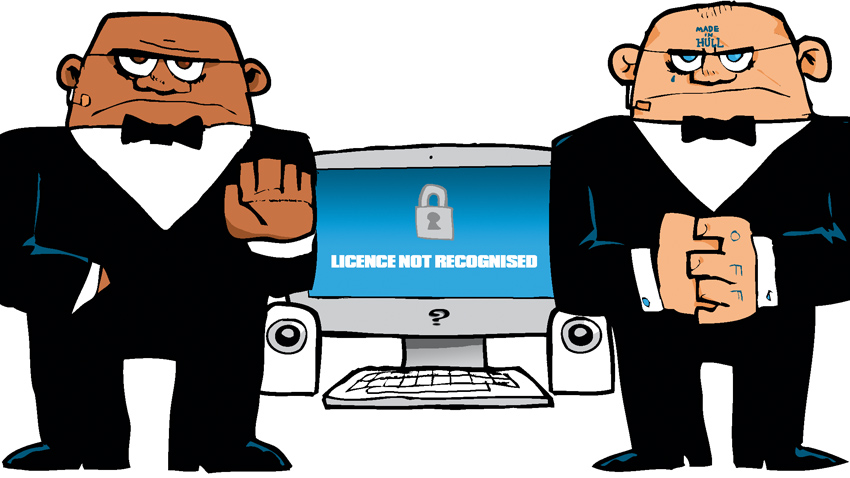What's the future of music software copy protection?
Following the issues with the iLok system, how should our licenses be managed?

Most of us understand that music software copy protection systems are a necessary inconvenience. The debate about how successful they are will go on and on, but the majority of companies feel that it's vital to minimise the threat of piracy in order to maximise their revenue and thus continue making great music software.
What's essential, though, is that these systems are as transparent and unobtrusive as possible. Whichever copy protection method is employed, you want it to be easy to set up (typically by authorising your product when you first install it) and then to 'just work'. If at any point it starts to slow you down or - worst case - to actually stop you from using a piece of software that you've paid for, there's a problem.
Unfortunately, this is what happened to some users recently following a major update to the iLok copy protection platform. For days, some of their licences weren't validating correctly or weren't appearing in the license manager. So, what exactly happened? We spoke to Andrew Kirk, Vice President at PACE Anti-Piracy, Inc - the developer of iLok - to find out.
"iLok.com is over ten years old, and we manage licenses from times prior to iLok.com and through various iterations of that product," he tells us. "This is tens of millions of digital assets. Many users still use these assets. While we had been testing for nearly a year - including load testing - there were some issues during and after the migration that caused both performance and stability issues. This led to issues related to the synchronisation of data on the iLok and the server. No licenses were ever lost, but the server alignment with some iLoks was temporarily affected."
"I want to make it clear that no one at our company thinks what happened was OK - we are deeply embarrassed and ashamed and have worked incredibly hard to make things right." Andrew Kirk, PACE Anti-Piracy
Fortunately, although the iLok system did run slowly for a while after the deployment, Kirk tells us that the actual number of users who had serious problems was actually very small - "less than one percent of the active user base" - and that the vast majority of them have now been sorted out.
Nonetheless, Kirk recognises how important it is that both developers and users have faith in their license management systems.
"We don't take any of our clients' business for granted. We continue to work hard with our customers to help them and their customer base as needed to return to the level of trust that existed prior to our early-June deployment. We have not forgotten about those affected and will be providing some [scheme] to give back to them in some way through product and services. This is being worked on now, but it is too early to announce. I simply wanted to make it clear that no one at our company thinks what happened was OK - we are deeply embarrassed and ashamed and have worked incredibly hard to make things right. We will continue to do this and work with those affected."
Get the MusicRadar Newsletter
Want all the hottest music and gear news, reviews, deals, features and more, direct to your inbox? Sign up here.
A developer's perspective
Honourable words, certainly, and we have no reason to doubt their sincerity, but how do the companies that rely on iLok feel? We spoke to Henrik Andersson Vogel, Marketing Manager at Softube, who use iLok to license their plugins. He confirmed that the glitch was restricted to a relatively small number of users.
"The iLok problem turned out to be limited to a certain type of license (updates), so it wasn't a very large percentage of our user base that was affected," he explains. "To the ones who were, it was nonetheless a really bad experience. Many of our users are professionals, and losing a day of work is simply not acceptable to them.
"With that said, the new update from PACE/ iLok is a very large and very welcome one. It has made the iLok system more secure, a lot easier to administrate, and has gotten a lot more user-friendly as well. So though the glitches around its launch were highly unfortunate, no licenses have been lost. Things are up and running now and are much better than they were before."
Although some affected iLok users were quick to take to the internet to vent their frustration during the problem period, Vogel also tells us that sales of Softube's products haven't been negatively affected since, and that they have faith in the platform going forward.
"Should people be wary of relying on just one platform to keep the bulk of their music software up and running?"
"[PACE's] communication could certainly have been better. But we know the PACE/iLok people well - they are clever people who know what they're doing, and we continue to have full confidence in their service."
One for all?
All's well that ends well, then, but the iLok glitch has shone fresh light on copy protection systems and reminded people how dependent they are on them. So, should people be wary of relying on just one platform to keep the bulk of their music software up and running?
"When things like this happen, it of course negatively affects the general trust users have towards software businesses," says Henrik Andersson Vogel. "But it is important to remember that only a handful of our customers have had issues with this update. Our opinion is that a central license management technology simplifies the workflow for the user. And it is better for us, since we can spend our time developing cool products rather than getting dirty with the inner bits and bytes of copy protection."
Unsurprisingly, Andrew Kirk is also a firm believer in both the iLok product and its concept going forward. "The iLok provides the highest level of IP protection for our publisher clients," he says. "For products that sell over a few hundred dollars, the iLok makes sense."
He also claims that, when given the choice between iLok and another kind of copy protection system, many customers actually prefer the hardware option.
"We have quite a few customers [software companies] who offer their internally-developed challenge/response systems that are cracked easily but also offer iLok as an option. Like us and those publishers, you would be astounded by the number of users who prefer the portability and convenience of iLok. All of your licenses are in one place - not 35 different methods of activation with ten different companies in six different time zones - there's zero downtime, and a single point of RMA when there are problems simplifies things for the user."
No copy protection system is going to please everyone but, as we've already noted, most users accept that they're necessary. We don't have any reason to suspect that the iLok glitch was anything other than an isolated incident, but if you really don't approve of this or any other method of license handling, you do have the option of letting music software companies know by voting with your wallet.
This article originally appeared in issue 195 of Computer Music magazine.


Computer Music magazine is the world’s best selling publication dedicated solely to making great music with your Mac or PC computer. Each issue it brings its lucky readers the best in cutting-edge tutorials, need-to-know, expert software reviews and even all the tools you actually need to make great music today, courtesy of our legendary CM Plugin Suite.












